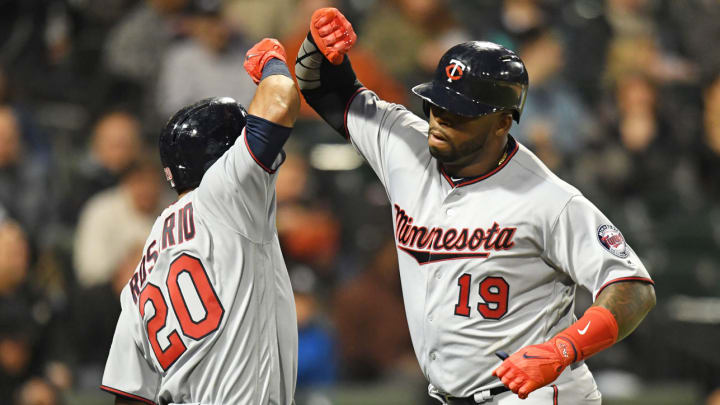As Twins Prepare for Wild Card Game, Their Puerto Rican Youngsters Think of Home

These should be among the best days of the Twins’ lives. A group of young players who lost 103 games last year stormed to the second American League wild card slot with a season no one expected. They will play the Yankees tonight, the first time 19 of the 25 players on the roster have experienced the postseason.
And yet for three of them—27-year-old first baseman Kennys Vargas, 26-year-old leftfielder Eddie Rosario and 23-year-old righthander José Berríos—the waning days of their thrilling pennant race have been difficult. Their native Puerto Rico suffered immeasurable damage when Hurricane Maria made landfall there on Sept. 20 and requiring a cleanup that will take months. Manager Paul Molitor pulled them together and offered them a day or two off, as he had when Hurricane Irma had threatened the U.S. territory earlier in the month. Even as their thoughts raced, they declined.
“It helps playing baseball,” says Vargas. “Your mind can concentrate on the game and you don’t worry so much about what’s happening in Puerto Rico. As soon as the game starts, you start.”
AL Wild Card Game Preview: Will Yankees Continue Postseason Domination of Twins?
Berríos spoke to his parents in Bayamón, 10 miles southwest of San Juan, before Maria hit. It took two days for them to call him and let him know they had made it through. Three days ago he and brother-in-law Javy Báez of the Cubs mailed generators home.
Vargas did not hear from his family in Canóvanas, 20 miles southeast of San Juan, until Sept. 24. The storm had knocked down cell towers; his younger brother had to climb onto the roof to get enough signal to call him. They spoke for only a few seconds—just long enough for Vargas to hear “We’re O.K.”—but he was awash with relief.
Rosario was in touch with his family in his hometown of Guayama, on the southern coast, during the hurricane. His father promised him everyone was O.K. But then power and cell service cut out, and he had to wait and hope. Finally, after five long days, his parents drove the 50 miles north to San Juan, where they were able to call him.
To be sure, they have been extremely lucky relative to many others—electricity has not been restored, and Berríos’s family is subsisting on bottled water, but everyone is safe and their houses survived largely intact. Elsewhere the carnage is unfathomable; more than half of the island’s 3.4 million residents are without clean water and more than 95% lack power. A third of gas stations have no fuel and only one of the island’s 69 hospitals is fully operational, although another 59 are working at some capacity. The official death toll of 16 has not been updated in nearly a week—a good indication that we still have no idea how many lost their lives in the fifth-worst hurricane ever to hit the United States.
The Twins are sure to emphasize their good fortune, but the last two weeks have been hard. When the clubhouse TVs alternated between ESPN and the Weather Channel, Berríos forced himself to look away. Rosario had trouble sleeping. Vargas imposed a social-media ban on himself. (“They just show the bad things,” he says. “Not the people who are fine.”) He had to deal with an unexpected concern: His mother had coincidentally come to New York to watch him play at Yankee Stadium not long before Maria hit. She spent the next several days insisting that she wanted to go home and be with their family—“I had to keep saying, No, it’s dangerous!” Vargas says—and finally, on Saturday, she flew back. He sleeps with his phone on his pillow, just in case.
Even though baseball is a distraction, there is a lot of time to wait around. Berríos started the day before Maria struck. He allowed three runs in 3 1/3 innings to the Yankees.
The Twins' Secret to Their Turnaround? It Might Be Hitting Coach James Rowson
“I tried not to think about it when I was on the mound,” he says in Spanish, “But every time I came to the dugout, it was the only thing I could think about. It was tough.”
And they have been largely unable to share their recent joys with the people who mean most to them. With television mostly out across the island, their families have to follow their games on their phones. They try to stay involved however they can. Whenever Rosario speaks to his relatives, they assure him, “Everybody’s good! Stay focused.” Berríos FaceTimed his parents during the Champagne celebration after Minnesota clinched a playoff berth, on Sept. 27. His dad cried.
The future is uncertain. The Twins are in the process of putting together an airplane full of supplies to send to the island. Some family members will join the players on the mainland once the offseason begins. Some will remain in Puerto Rico. There are trees to be cleared and neighbors to be fed and electricity to be restored. But tonight Rosario’s friends and family will gather at a restaurant in Guayama, the only place nearby with a working TV, and cheer for the Twins. And tomorrow they will get back to work.

Stephanie Apstein is a senior writer covering baseball and Olympic sports for Sports Illustrated, where she started as an intern in 2011. She has covered 10 World Series and three Olympics, and is a frequent contributor to SportsNet New York's Baseball Night in New York. Apstein has twice won top honors from the Associated Press Sports Editors, and her work has been included in the Best American Sports Writing book series. A member of the Baseball Writers Association of America who serves as its New York chapter vice chair, she graduated from Trinity College with a bachelor's in French and Italian, and has a master's in journalism from Columbia University.
Follow stephapstein